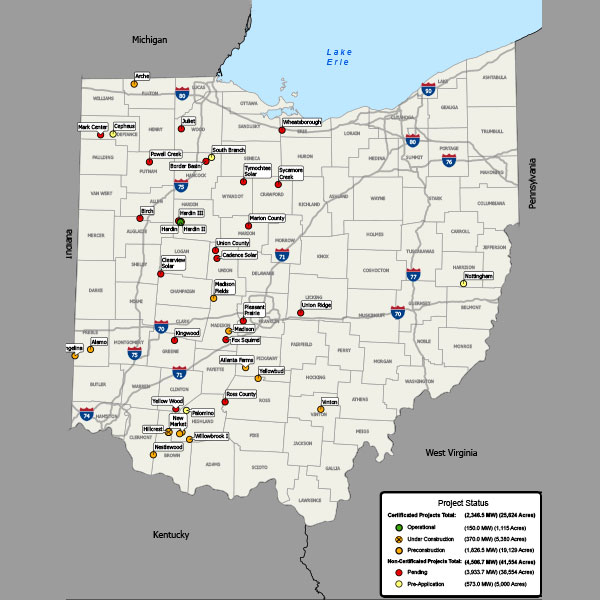Ohio Gov. Mike DeWine signed legislation Monday empowering county governments to review and approve or deny all proposed utility-scale wind and solar projects before developers can apply to the Power Siting Board (OPSB), a state agency that has had sole authority over the development of power plants, power lines and gas lines for half a century.
SB 52, as approved by both the Ohio House of Representatives and Senate on the last day of the legislature’s spring session, allows county commissions to reject proposed projects after a public hearing and a 90-day review.
The law becomes effective in October and has no impact on projects the OPSB approves before then. About 4,500 MW of solar projects pending before the board are grandfathered under the legislation, as well as several thousand megawatts of projects pending before PJM.

The law also empowers county commissions to declare parts of or all unincorporated land in a county as an “exclusion zone” indefinitely blocking any large wind or solar projects — subject to the right for a petition by those opposed to the ruling to place it on the ballot at the next regularly scheduled election.
The new law does not give counties authority over the development of conventional power plants, transmission lines or gas lines. Those remain under the sole authority of the OPSB.
The legislation also requires the seven-member OPSB to seat a county commissioner and a township trustee as voting members when it considers a proposed utility-scale wind or solar project.
Initial versions of bills introduced in February in both chambers would have given authority to township trustees to decide utility-scale wind and solar projects. The legislation was amended after intense negotiations with solar developers that went on for weeks.
Hundreds of rural residents crowded into utility committee hearings over several months testifying both for and against the legislation, including the last amended version produced just hours before the final floor votes. Voting was along partisan lines, with a few Republicans lawmakers joining Democrats to oppose the measure.
Many farmers opposed the legislation because wind and solar leases provide a long-term, steady income stream to augment crop income. The issue for them came down to property rights.

A coalition of eight farming organizations, including the Ohio Farm Bureau, sent a letter to DeWine on July 2 asking him to veto the bill.
“We write to you today asking you to veto SB 52, a bill that takes away landowners’ rights without their consent or notification. We understand and appreciate the complex nature of this topic and the difficult position many of our rural communities face due to wind and solar development. A government taking of property rights, however, is not the answer,” the letter said. “This is an unprecedented shift in the state’s land-use policy. It can have chilling ramifications for agriculture in the future. Therefore, we respectfully ask you to veto the legislation.”
The Ohio Farm Bureau on July 7 posted a link to a staff blog and transcript discussing the implications of the legislation.
News of the governor having signed the bill first appeared in releases issued by lawmakers on Monday. The governor’s office posted a two-sentence notice on its website after hours on Monday without mentioning the name of the bill in the title of the release.

